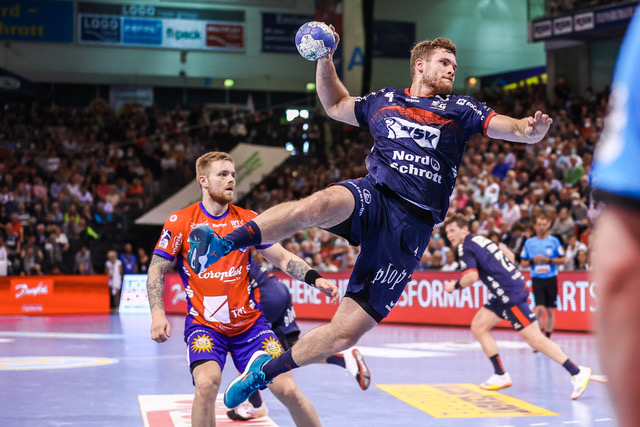So-called wearables - mini computers worn on the body that measure certain bodily functions - have been part of our everyday lives for some time now. In competitive sports, they have long been part of the basic equipment. The devices produce an infinite amount of data and provide information about fitness and exertion. In professional sport, the use of artificial intelligence (AI) offers additional advantages - however, the use and consistent evaluation of the data has so far been limited. Scientists at Paderborn University have now joined forces with the SG Flensburg-Handewitt professional handball team as part of a research project to investigate how the use of algorithms can minimize the risk of injury and improve athletes' performance. The researchers have also developed an AI that predicts goals.
Data is recorded, but hardly ever analyzed
"Artificial intelligence is generally used to detect injury risks or to develop key indicators relating to the performance of professional athletes. With Liverpool FC and FC Barcelona, two heavyweights on the international sports scene are already relying on the possibilities of data analysis using AI. In the German Handball League, data has been systematically recorded for two years, but the corresponding use is still a long way off," says Prof. Dr. Jochen Baumeister, Head of the AG Trainings- und Neurowissenschaften at Paderborn University.
Win-win situation for sport and science
SG Flensburg-Handewitt plays a leading role in European handball in this area. Athletics coach Michael Döring explains: "Movement data is becoming increasingly important in our daily training. But we want to go one step further and are therefore already working on the future of data use in professional sport. Together with the scientists at Paderborn University, we want to make the individual performance of our players quantifiable." The use of AI offers a broad spectrum of previously unimagined possibilities. Baumeister speaks of a win-win situation for sport and science: "We have been working closely with SG Flensburg-Handewitt for years and, through my Paderborn colleague Prof. Dr. Oliver Müller from economics, we now have the right tools to set up data analysis in a future-oriented and innovative way. This benefits science and sport in equal measure." Müller holds the Chair of Wirtschaftsinformatik insb. Data Analytics at the University of Paderborn. Among other things, he is researching how people can make better decisions through the use of algorithms.
AI predicts goals
In the project, sensors record the locations of the players and the ball every fifty milliseconds. But the really exciting thing is the AI that the Paderborn scientists have developed. "PIVOT" - as it is called - independently recognizes movement patterns in the measurements and can use the data to predict how likely it is that a goal will be scored within the next few seconds. Müller explains: "PIVOT makes it possible to calculate the probability of a goal being scored or conceded in real time. If you compare this probability before and after a certain move, you can measure how good - or bad - this move and the associated decisions made by the players were." Baumeister adds: "Quantifying performance is a good basis for investigating correlations - such as with the nervous system. It provides valuable insights into the players' condition and actions." For SG coach Maik Machulla, the findings can provide good support in everyday training and matches in the future. "The innovative handling of the data opens up new possibilities for us. Thanks to the many years of intensive cooperation with the University of Paderborn, we can be pioneers in the HBL and in European handball," says Machulla.
So far, the research team has evaluated the actions of players in possession of the ball. According to Baumeister, extending this to players who are not in possession of the ball could provide further insights. For each scenario, the difference between the estimated best possible action and the action actually performed could also be calculated.
Reports on the project can also be found on the website of the mdr, the WB and on sportschau.de.



